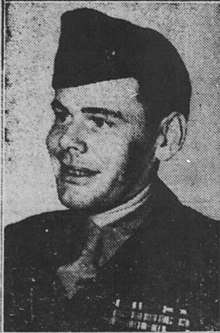Albert L. Ireland
Albert Luke Ireland (February 25, 1918 – November 16, 1997) was a staff sergeant in the United States Marine Corps who was wounded five times during World War II in the Pacific theater and four times during the Korean War. His receiving nine Purple Heart Medals is the second most decorated (Curry T. Haynes – 10) to a single individual of the United States Armed Forces.[1][2][3]
Albert Luke Ireland | |
|---|---|
 Ireland in early 1951, before shipping out for Korea | |
| Born | February 25, 1918 Cold Spring, New York |
| Died | November 16, 1997 (aged 79) Kansas |
| Buried | Cold Spring, New York |
| Allegiance | |
| Service/ | |
| Years of service | 1941–1953 |
| Rank | |
| Battles/wars | World War II Korean War |
| Awards | |
Ireland was born in Cold Spring, New York. He enlisted in the Marine Corps in 1941 after serving in the Royal Canadian Air Force during the same year. Ireland's military awards also include two Bronze Star Medals and campaign and service medals with eight battle stars. He spent 27 months overseas during World War II, serving as a machine gunner, and was wounded once in the Guadalcanal Campaign and four times in the Battle of Okinawa. As a result of his wounds, Ireland received five Purple Hearts.[4]
Ireland became a Marine Corps Reservist after the end of World War II, and attended the School of Health and Education at Ithaca College between 1948 and 1949,[5] the University of Arizona, and the University of Notre Dame. He was called back to active duty in the fall of 1950 after the outbreak of the Korean War, completing refresher combat training at Camp Lejeune in early January 1951 and applying for combat duty. However, the first sergeant there who was creating the list of Marines to be sent to Korea attempted to prevent him from going as he had received more than two Purple Hearts, in accordance with Marine Corps regulations, but was overruled after Ireland appealed to Commandant of the Marine Corps General Clifton B. Cates in Washington, D.C.[6] He was flown from Washington to San Francisco en route to Korea.[4]
In 1953, Ireland was honorably discharged from the Marine Corps after being wounded in the leg, hand, neck and face in Korea.[1] He was a lifetime member of the Cold Spring Fire Department. A section of New York State Route 301 was named after Ireland on August 20, 2002.[7][8] His place of death was Kansas. Ireland is buried in Cold Spring Cemetery. The Putnam County Sheriff's Dept. named a Marine Patrol Boat after Ireland; it currently patrols the Hudson River.
Military awards and decorations
| Bronze Star Medal w/ 1 gold service star |
Purple Heart w/ 1 silver oak leaf cluster and 3 bronze oak leaf clusters |
American Defense Service Medal | |||
| American Campaign Medal | Asiatic-Pacific Campaign Medal w/ 2 bronze service stars |
World War II Victory Medal | |||
| National Defense Service Medal | Korean Service Medal w/ 1 bronze service star |
United Nations Korea Medal |
References
- "National Affairs: Fighting Man". Time. July 27, 1953. Retrieved September 20, 2012.
- Leiter, Maria Theodore (November 17, 2004). "War Hero Comes Home". Putnam County Online. Archived from the original on 2013-01-31. Retrieved September 21, 2012.
- "8 Combat Heroes With the Most Purple Hearts". Archived from the original on 2017-09-21. Retrieved 2018-01-03.
- "Wounded 5 Times, Marine Heads for Battle Duty Again". The Lansing State Journal. AP. 12 January 1951. p. 2. Retrieved 3 January 2017 – via Newspapers.com.
- "Wounded Marine Who Attended Ithaca College Reenlists". The Ithaca Journal. 12 January 1951. p. 3. Retrieved 3 January 2017 – via Newspapers.com.
- "2 Wounds or Not, Marine Ireland Will Get to Fight". The Terre Haute Star. AP. 8 January 1951. p. 12. Retrieved 3 January 2017 – via Newspapers.com.
- New York State Legislature. "Bills of New York State – bill number-based search (S5082B, 2001)". Retrieved February 5, 2010.
- "Odell: Putnam First in NY to be Designated Purple Heart County". Putnam County Online. April 5, 2013. Retrieved 16 April 2014.